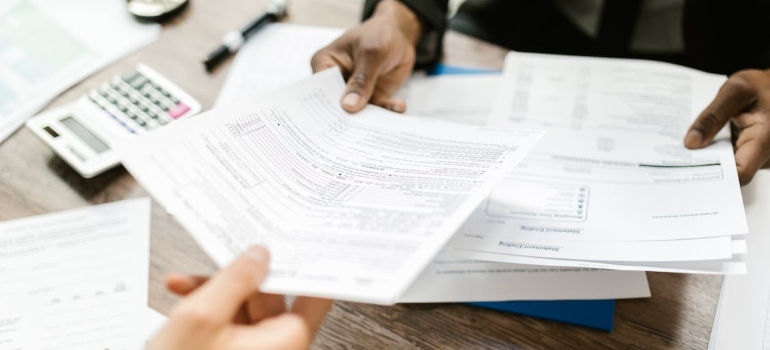Florida has long been a popular destination for homeowners and real estate investors alike. With its beautiful weather, pristine beaches, and thriving economy, the state offers many opportunities for those looking to buy property. However, like any other state, Florida imposes real estate taxes on property owners. Florida real estate taxes can vary depending on a number of factors, including the value of the property and its location. For homeowners and investors, understanding how these taxes work and how to manage them is crucial. Failure to do so can lead to unexpected expenses and financial difficulties. In this article, we will provide tips and guidance for homeowners and investors on how to navigate the complex world of Florida real estate taxes. From understanding the different types of taxes to finding ways to reduce your tax bill, Best Movers in Florida will cover everything you need to know.
Florida real estate taxes 101: Understanding property and transfer taxes for homeowners and investors
When it comes to owning real estate in Florida, property taxes and transfer taxes are inevitable expenses. Property taxes are levied annually based on the value of the property. The transfer taxes are applied when ownership of the property is transferred from one party to another.

In Florida, property taxes are assessed by the county property appraiser’s office. Additionally, they are collected by the county tax collector’s office. The amount of property taxes a homeowner or investor owes is based on the assessed value of the property, and various exemptions and deductions may be available to reduce the tax bill.
Comparing Florida to other states
Compared to other states, Florida’s property tax rates are relatively low. However, some counties in the state have higher rates than others. Also, investors may also be subject to additional taxes, such as tourist development taxes and sales taxes on rental income. Understanding the types of taxes you may be subject to and how they are assessed and collected is crucial for managing the financial aspects of your real estate investments in Florida.
Maximizing tax savings: Strategies for reducing real estate taxes in Florida
When it comes to real estate taxes in Florida, there are several strategies that homeowners and investors can use to reduce their tax liability. One of the most effective ways to do this is by claiming exemptions and deductions. And, that applies to every case, regardless of location. Whether you’re moving to Key West with the assistance of the best movers in Key West, or any other place, use the following strategies and they will benefit you greatly.
Homestead exemptions
For example, Florida offers a homestead exemption that can significantly lower a homeowner’s property taxes. To qualify for this exemption, the property must be the homeowner’s primary residence and they must have owned it for at least six months out of the year. The exemption can reduce the taxable value of the property by up to $50,000, resulting in a substantial reduction in the property tax bill.
Other ways of reducing Florida real estate taxes
Another way to reduce real estate taxes in Florida is to take advantage of deductions for property improvements and renovations. By keeping track of these expenses and deducting them from their taxable income, homeowners and investors can lower their overall tax liability.

Working with a tax professional who is knowledgeable about Florida real estate taxes is also an important step in minimizing tax liability. They can provide advice on which exemptions and deductions apply, as well as identify other tax-saving strategies specific to Florida.
Maximizing tax benefits for real estate investors in Florida: A comprehensive guide
As a real estate investor in Florida, it is crucial to understand the tax implications of buying, holding, and selling properties. The tax laws and regulations surrounding real estate investments can be complex. The same can be said for all cities in Florida, from Weston down South to Jacksonville up North. Nevertheless, with the right knowledge and guidance from the best movers in Weston investors can significantly reduce their tax liabilities and maximize their returns.
Buying and holding real estate in Florida can have tax advantages, such as deducting mortgage interest, property taxes, and depreciation. However, investors should also consider the tax implications of selling a property. Capital gains taxes can be a significant expense, but there are strategies that investors can use to minimize their tax liabilities.
1031 exchange
One such strategy is a 1031 exchange. It allows investors to defer paying capital gains taxes by exchanging one investment property for another. Another tax-saving strategy is cost segregation. It involves separating a property’s components and depreciating them over shorter time frames to accelerate tax deductions.
The tax implications of real estate investing
Real estate investing in Florida can be a lucrative opportunity, especially in some red-hot real estate markets like the one in Miami and the surrounding areas. However, before you hire some of the best movers in North Miami to relocate there, carefully consider the tax implications of your investments. Understanding the tax laws and regulations and working with a tax professional is crucial. This way the investors can minimize their tax liabilities and maximize their returns.
Keys to understanding the Florida real estate taxes
Florida real estate taxes are a crucial consideration for anyone who owns or plans to buy property in the state. In Florida, property taxes are based on the assessed value of the property and the applicable millage rate. Florida offers a homestead exemption for primary residences, which can reduce the taxable value of the property by up to $50,000. To qualify, the property owner must be a Florida resident and use the property as their primary residence.

Property taxes in the State of Florida are due annually and can be paid in two installments. The due dates are March 31st and September 30th of each year. Rental income from Florida properties is subject to state and federal income taxes. Property owners can deduct expenses related to the property. This includes mortgage interest, property taxes, repairs, and maintenance, to reduce their tax liability. Real estate investors can utilize several tax-saving strategies. These include cost segregation, which allows them to depreciate certain assets at an accelerated rate, and 1031 exchanges, which defer Florida real estate taxes on the sale of investment property. That is all we have for you today. Thank you for reading the article.
